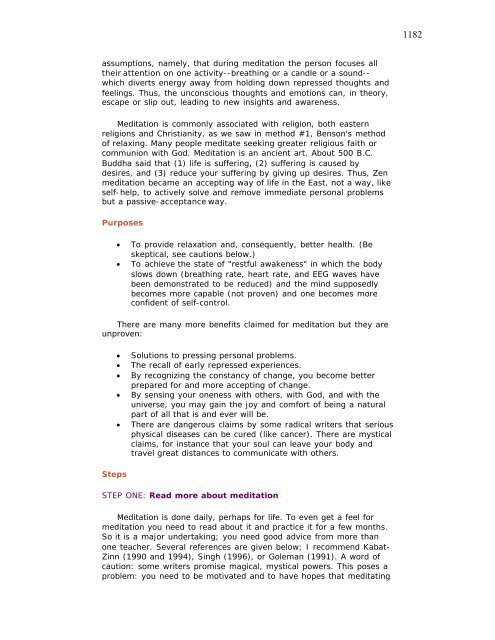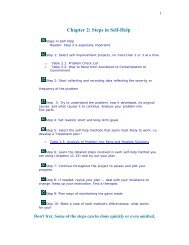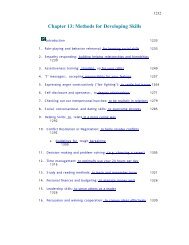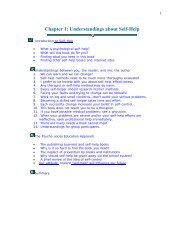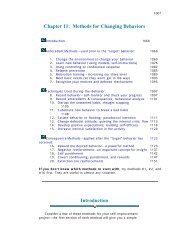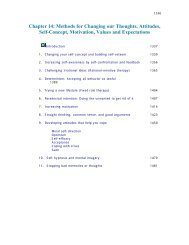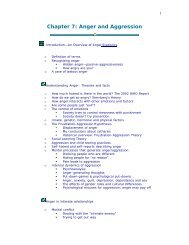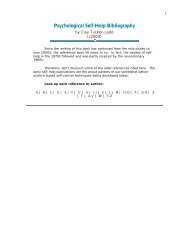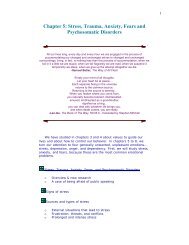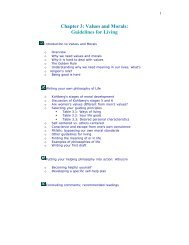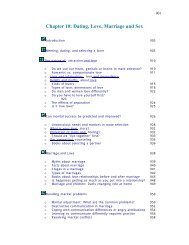Chapter 12: Methods for Changing Emotions - Psychological Self-Help
Chapter 12: Methods for Changing Emotions - Psychological Self-Help
Chapter 12: Methods for Changing Emotions - Psychological Self-Help
Create successful ePaper yourself
Turn your PDF publications into a flip-book with our unique Google optimized e-Paper software.
1182<br />
assumptions, namely, that during meditation the person focuses all<br />
their attention on one activity--breathing or a candle or a sound--<br />
which diverts energy away from holding down repressed thoughts and<br />
feelings. Thus, the unconscious thoughts and emotions can, in theory,<br />
escape or slip out, leading to new insights and awareness.<br />
Meditation is commonly associated with religion, both eastern<br />
religions and Christianity, as we saw in method #1, Benson's method<br />
of relaxing. Many people meditate seeking greater religious faith or<br />
communion with God. Meditation is an ancient art. About 500 B.C.<br />
Buddha said that (1) life is suffering, (2) suffering is caused by<br />
desires, and (3) reduce your suffering by giving up desires. Thus, Zen<br />
meditation became an accepting way of life in the East, not a way, like<br />
self-help, to actively solve and remove immediate personal problems<br />
but a passive-acceptance way.<br />
Purposes<br />
· To provide relaxation and, consequently, better health. (Be<br />
skeptical, see cautions below.)<br />
· To achieve the state of "restful awakeness" in which the body<br />
slows down (breathing rate, heart rate, and EEG waves have<br />
been demonstrated to be reduced) and the mind supposedly<br />
becomes more capable (not proven) and one becomes more<br />
confident of self-control.<br />
There are many more benefits claimed <strong>for</strong> meditation but they are<br />
unproven:<br />
Steps<br />
· Solutions to pressing personal problems.<br />
· The recall of early repressed experiences.<br />
· By recognizing the constancy of change, you become better<br />
prepared <strong>for</strong> and more accepting of change.<br />
· By sensing your oneness with others, with God, and with the<br />
universe, you may gain the joy and com<strong>for</strong>t of being a natural<br />
part of all that is and ever will be.<br />
· There are dangerous claims by some radical writers that serious<br />
physical diseases can be cured (like cancer). There are mystical<br />
claims, <strong>for</strong> instance that your soul can leave your body and<br />
travel great distances to communicate with others.<br />
STEP ONE: Read more about meditation<br />
Meditation is done daily, perhaps <strong>for</strong> life. To even get a feel <strong>for</strong><br />
meditation you need to read about it and practice it <strong>for</strong> a few months.<br />
So it is a major undertaking; you need good advice from more than<br />
one teacher. Several references are given below; I recommend Kabat-<br />
Zinn (1990 and 1994), Singh (1996), or Goleman (1991). A word of<br />
caution: some writers promise magical, mystical powers. This poses a<br />
problem: you need to be motivated and to have hopes that meditating


